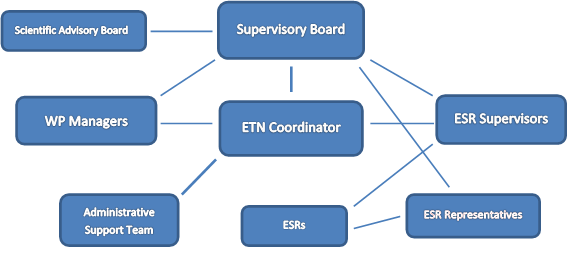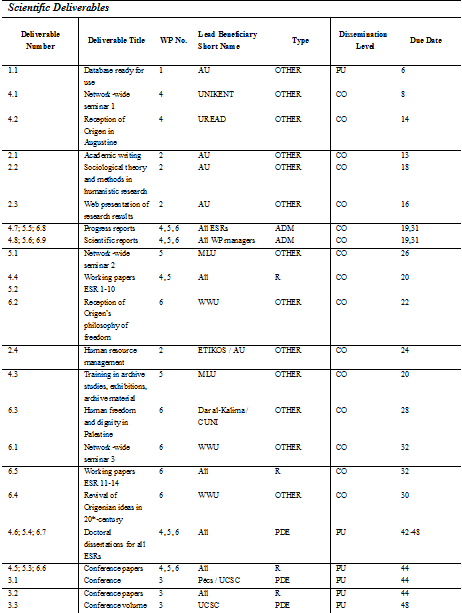Management and work packages
Management and work packages
This page contains information on the management, the work packages and the deliverables.
The management structure in the ITN consists of several entities:
Supervisory Board (SB)
The SB is the decision-making body of the consortium. It consists of one representative of each beneficiary as well as two representatives from the ESRs who should be present or represented at any meeting. The partner organizations are also invited to the SB meetings. It is chaired by the Coordinator. Its main tasks include preparation and organization of meetings, establishing voting rules and quorum, risk management, monitoring the quality of the research training and overall supervision of the network. Moreover, the SB is responsible for communication in the network, administering the division of overhead between the different participating beneficiaries, as well as for advertising the scholarships and selecting the ESR candidates. Its meetings will be held at least once every six months.
Coordinator (Anders-Christian Jacobsen)
The Coordinator acts as the intermediary between the beneficiaries and the Funding Authority. Works together with the Supervisory Board and the Management Support Team on day-to-day management. He monitors that all obligations are fulfilled (including collecting and submitting reports and other deliverables, e.g. financial statements, to the Funding Authority), prepares the SB meetings (including chairing the meetings, making the agenda and minutes and monitoring the implementation of decisions taken at meetings), administers the financial contribution of the Funding Authority, and oversees research/training activities. The Coordinator implements SB decisions; in case of acute problems, the Coordinator communicates with relevant WP manager.
The Administrative Support Team
Assists the Supervisory Board and the Coordinator. It is responsible for the day-to-day management of the project.
Scientific Advisory Board
Consists of three external research experts, including one non-academic representative who cannot be chosen from beneficiaries or partner organizations. It is established by SB, meets with SB once a year, and assists and facilitates the decisions made by the SB. Offers overall strategic advice to stakeholders on career planning, training content, etc. The members are allowed to participate in Supervisory Board meetings upon invitation, but do not have voting rights.
WP Managers
Responsible for activities in each WP. The WP managers will work closely together with the Coordinator. Changes and problems of implementation of WPs should be discussed with the Coordinator or, if necessary, with the SB.
Supervisors of the ESRs
Responsible for research/training activities of ESRs, following the rules of each beneficiary as well as general rules decided by SB. Responsible for drawing up plans for the ESR’s project and career development (with the ESR).
ESR representatives
The chosen ESR representatives for the SB, organizes the ESRs. Meetings in connection with the network-wide seminars and the final conference.

Work packages
The network includes the following work packages:
WP 1: Management (AU)
Objectives Overall managing of the network including economy and organisation. The supervisory board (SB) is responsible for the overall management of and strategical decision-making in the network, monitoring quality of research training, overall supervision, communication, administering division of overhead, advertising scholarships, and selecting ESR candidates. The day-to-day management – financial and risk management (incl. Risk Register), making agendas for meetings, general overview of the network-wide activities, especially training activities – is delegated to the NC, who must follow and implements the decisions of the SB, in close co-operation with the Scientific Advisory Board and the Administrative Support team. At every meeting in the SB, the period since last meeting will be evaluated, and measures to meet new challenges will be discussed. The financial department of AU will work directly with the financial departments of the other beneficiaries and partner organisations. Concerning the management of the research and training activities, the NC will work closely together with the managers of the different WPs.
WP 2: Training (AU)
Objectives Coordination of course and training activities. The lead beneficiary should coordinate activities planned by other beneficiaries and partners, cf. table 1.2b, support individual career planning for the ERS in close co-operation with the Scientific Advisery Board, and provide an overall career development plan for all ESRs in cooperation with the supervisors.
WP 3: Dissemination (UCSC)
Objectives Planning and coordination of dissemination activities. The leader of WP 3 should coordinate the advise on publication of doctoral thesis and other publications; secure the establishment and update of a webpage for the network (beneficiaries, partner organisations, and ESRs contribute with content); coordinate mass-media contact between mass-media, all beneficiaries, all partners, and all ESRs. We aim at presenting the network in mass-media in all involved countries during the project period; plan final conference and edit conference volume.
WP 4: Reception of Origen’s ideas about human freedom and dignity in the Medieval period (UREAD)
Objectives Coordinating and inspiring research activities in this part of the network theme. Together with the supervisors: coordinating and inspiring research in this area of the research network, cf. subprojects no. 1-3. This includes other research contributions to this part of the network, e.g., articles written by the involved supervisors; Planning of the 1st network-wide seminar together with leader of WP 2; Planning of special research seminar for ESRs and supervisors involved in this area of the project.
WP 5: Reception of Origen’s ideas of human freedom and dignity in the early modern and modern periods (MLU)
Objectives Coordinating and inspiring research activities in this part of the network theme. Together with the supervisors: coordinating and inspiring research in this area of the research network, cf. subprojects no. 4-10. This includes other research contributions to this part of the network, e.g., articles written by the involved supervisors; Planning of the 2nd network-wide seminar together with leader of WP 2; Planning of special research seminar for ESRs and supervisors involved in this area of the project.
WP 6: Reception of Origen’s ideas of human freedom and dignity in contemporary theology and philosophy and beyond academia (WWU)
Objectives Coordinating and inspiring research activities in this part of the network theme. Advising network members and external stakeholders on how to use the results of the network research beyond academia. Together with the supervisors: coordinating and inspiring research in this area of the research network, cf. subproject no. 11-14. This includes other research contributions to this part of the network, e.g., articles written by the involved supervisors; Planning of the 3rd network-wide seminar together with leader of WP 2; Planning of special research seminar for ESRs and supervisors involved in this area of the project; Advising the beneficiaries and partners during the project period about how the results of their research can be used an implemented outside of academia; Planning of module on the final conference of the network about implementation of the research results outside of academia: Coordinating with the leaders of WP 2 and 3.
WP 7: Ethics (AU)
Objectives The objective in this WP is to ensure compliance with the ethics requirements set out in this work package.
Deliverables

